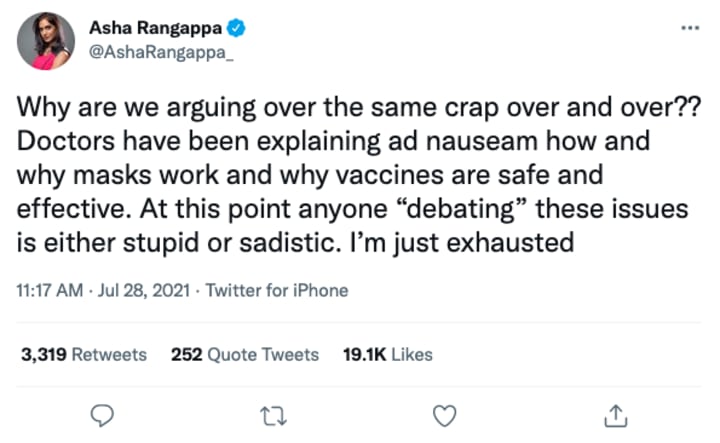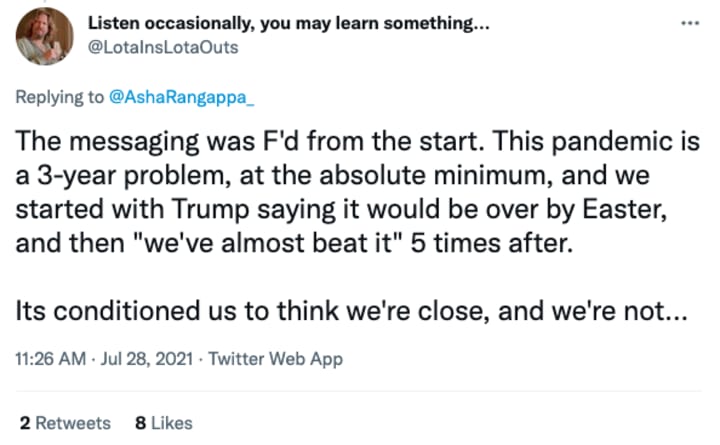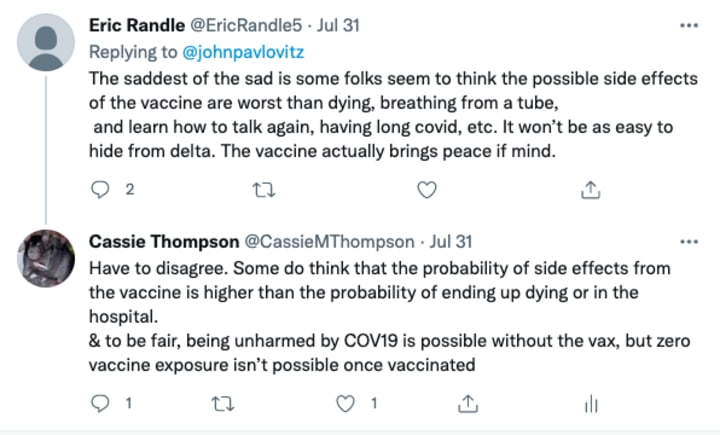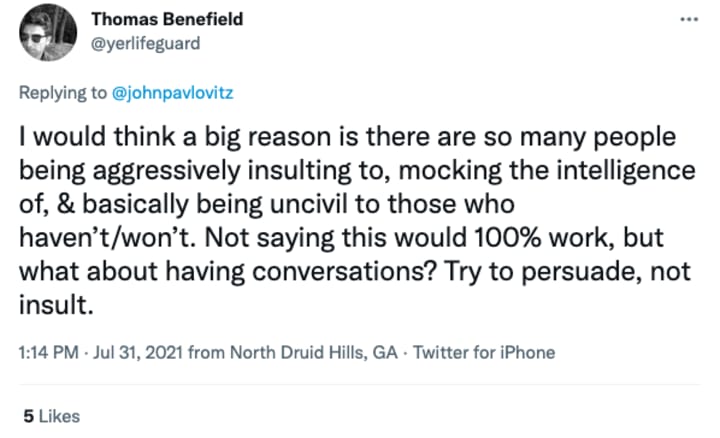What People Don't Understand About Anti-Vaxxers
For those who are frustrated
Although I wouldn’t call myself an “anti-vaxxer,” I do think I fall into the group that is being called “vaccine hesitant.” In addition, I’m sane and logical, and a liberal, so I’m in an interesting space where I’m able to see each side of what has become an extremely polarizing issue. Even as I stand in the middle, I sympathize with the difficulty this decision presents for many people. Personally, I decided to get the vaccine because it was a requirement for work and will be for future travel. But I still feel very uncomfortable at being coerced into this decision, which I would not have made otherwise.
Below I'll examine the four main groupings that represent where people are falling on this issue. You'll notice that there are two extremes, and two more middle-ground factions.
On the one hand, you have the pro-vaccine camp who apparently jumped at the chance to get vaccinated, left the questioning to the professionals, and trusted in our institutions to provide us with a safe vaccine that would help to end the pandemic. These people are emphatic that the vaccine is the only way to move forward and that we must all submit to it. They have lately become apoplectic that there is still a significant portion of the country holding out and not being vaccinated, for god knows why (seriously, they don’t understand why). These pro-vaccine individuals largely consider the failure to be vaccinated as a moral failure too, and think of vaccination as a civic duty we owe to our countrymen.
A step beyond these folks, towards the middle of the road, you have the reluctantly doing-our-part group. These are the people who felt some concern or hesitancy about the vaccine, but still got vaccinated when they had the chance. Although they had worries, ultimately they also decided to trust in the voices advocating for vaccination. These people were “doing their part” even if they acknowledged there would be some personal risk. They swallowed their fear and got vaccinated for the greater good, or out of a greater fear of COVID than the vaccine. These folks, unlike the pro-vax group, generally do respect the right to choose whether or not to be vaccinated because of their own reasons for reluctance, which is a main reason they are different from the pro-vaxxers, and not very common.
People like me are in the third camp, the vaccine hesitant camp. Like the previous group, we have concerns about the vaccine. Most of us, though, are holdouts who are still refusing to be vaccinated. We are largely not convinced of COVID being as dangerous to us as it’s purported to be, and worried the vaccine may pose a greater danger. We might be the people you see walking around unmasked, or protesting mandates and quarantines. The amount of conflicting instruction and disinformation we have seen over the past year and a half has made us extremely wary of putting trust in our institutions or this vaccine. In general, this group intends to wait and see what happens because we feel this vaccine was rushed and may be harmful to our personal health.
Finally, on the opposite side of the spectrum from the pro-vaxxers, are the anti-vaxxers. Admittedly, these people are largely driven by fear and at least some of it is unfounded. This camp is highly varied, with some people refusing the vaccine because of their belief that the government is trying to surreptitiously install us with microchips, while others simply find the increasing social pressure to vaccinate so suspicious and off putting that they cannot bring themselves to do it. These folks also value their personal freedom and bodily autonomy, as we all do, but are exercising that decision-making power in a way that the majority of the country do not agree with. Isn’t that the point of making your own decisions though? There will be disagreement. So, although some of these people have questionable reasons for spurning the vaccine, ultimately they do have one strong foundation, which is their right to personal choice in accepting or rejecting the injection of what is unquestionably a vaccine that carries risk.

So now that the different sides have been spelled out, we can examine some of the arguments that have been made recently. In particular, it’s worth examining that the pro-vaccine individuals have lately been significantly more vocal about their anger towards those who still refuse to be vaccinated.
Why is that? Are the unvaccinated responsible for the pandemic continuing?
First, it’s important to recognize the number and severity of accusations being thrown at the unvaccinated. Many who have received the vaccine now say that if you don’t have the vaccine, you are among those personally responsible for people dying, and for the COVID pandemic being dragged out. The issue doesn’t seem to be just about people getting sick and dying anymore, though. Now, it seems much of the anger is due to the restrictions and requirements being reinstated as COVID cases continue to cycle. It seems every week that COVID cases are on the rise again, only to fall, and then rise once more. This whiplash has led local governments to continually change policies regarding business openings, travel and quarantine rules, mask requirements and social distancing enforcement.

Those who have been vaccinated are especially frustrated by these impositions being once again thrust upon them, because they seem to have thought that once they were vaccinated, they could return to normal and stay there. So, the unvaccinated are being dealt the blame. But are the unvaccinated the reason COVID continues, or was it going to even if we had 80 or 90 percent compliance?
One thing we have seen over and over again since COVID hit, but we never seem to actually learn, is that nothing we do is going to make the pandemic just go away. Nothing we do is going to resolve the issue, or get us permanently back to normal. Nothing we have done, in any place in this country, has continually proven effective against COVID.
Even with perfect compliance of social distancing and mask wearing, there would still be COVID cases. And of course, perfect compliance is impossible. So why do we think that we will get anywhere close to perfect compliance with the vaccine either? And even if we did, which we won’t, what makes people think that would resolve COVID? We don’t live in a bubble. And unless we also had perfect (or near perfect) compliance around the world, or completely shut our borders, it wouldn’t really matter what we do within them. The cycle will continue whether we like it or not.
And have we been reading the news, folks? The vaccine doesn’t keep you from contracting COVID. In fact, many vaccinated people have unknowingly contracted and spread it. So really, there’s no reason that the vaccinated should be excused from mask and social distancing guidelines if the rest aren’t. We’re all still vectors, whether or not we have had the shot.
Of course the vaccine does increase your likelihood of survival if you do contract COVID, not that COVID poses a high fatality risk to most anyway (“infection fatality rates ranged from 0.00% to 0.31% with crude and corrected medians of 0.05%") but if you are a high-risk individual or have pre-existing conditions then certainly it may be in your best interest to accept the risk of the vaccine over the risk of contracting COVID.

The thing is, as healthy individuals we never know if we’re the unlucky one who might randomly die from COVID or face complications from the vaccine. In all likelihood, we’re neither. But as I explained to someone on Twitter, the person who is reluctant to take the vaccine knows that they MAY be exposed to COVID if they don’t get the vaccine, but also that they WILL be exposed to the vaccine if they accept the vaccine shot.
Get it? If you don’t take the vaccine, you may never have COVID and you avoided exposing yourself to the risk of the vaccine as well. Of course, you might get COVID, but in all honesty, you’ll probably be fine. It seems you’ll probably be fine with the vaccine too, but we don’t even have a year of data on the effects of the vaccine at this point, whereas with COVID we do. There is a very logical basis for people trying to minimize their exposure and risk here.
What I’m trying to communicate here is that the people who have not been vaccinated are not unvaccinated because they are evil, or stupid or brainwashed. They are trying to look out for themselves, trying to keep afloat in an ocean of reasonable doubt. It doesn’t help to tell these people that they are killers, or idiots, or selfish. Misrepresenting their viewpoint is one reason they will not join you in taking the vaccine. When you throw hyperbolic accusations and bad-faith arguments at people, you do not win anyone over. And in fact, you only make people suspicious of your motives and ability to question those in power.
We’ve seen this before, haven’t we? Remember how the independent voters and radical liberals were blamed when Trump won the presidency? If only they had voted the way the Hillary supporters wanted, then Trump would never have won! Therefore, it’s all their fault!
As I said then, I’ll say it again now: If people aren’t on your side, it’s because you haven’t convinced them. That makes it your fault, not theirs.

Instead of berating people who haven’t been vaccinated, instead of being condescending and patronizing, maybe it would be more effective if the vaccinated showed their work. Tell others what evidence helped you make your decision. But even more importantly, I think the vaccinated just need to listen if they want to bridge this gap. Try to hear exactly why people are waiting and what they would need to see to change their minds. There is so little understanding and so much hostility coming from the vaccinated, that communication seems to have completely shut down between these opposing factions.
The main thing I’d like folks to take away from this is that if your goal is to get people vaccinated, you’ll need to work on your sales pitch.







Comments
There are no comments for this story
Be the first to respond and start the conversation.